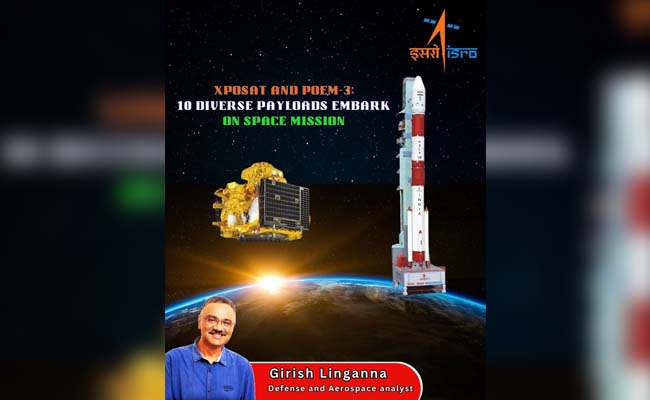XPoSat Launches with POEM: 10 Payloads Innovate in Orbital Space"
Girish Linganna ,
Vartha Bharati | 29-12-2023 | 20:36:00 IST
India's space endeavors in 2024 are set to commence with a launch on the first day of the year. The Indian Space Research Organisation (ISRO) is currently in the final stages of pre-launch activities, preparing to deploy the X-Ray Polarimeter Satellite (XPoSat) aboard a Polar Satellite Launch Vehicle (PSLV). Following the deployment of the main satellite, the PSLV's last stage will carry an additional 10 payloads.
In addition to XPoSAT, the primary satellite, the PSLV mission will transport an additional 10 payloads or instruments into space using its final stage, known as the PSLV Orbital Experimental Module, or POEM.
Space Startups Launch Cutting-Edge Technologies
The five instruments included on the POEM platform, as detailed by ISRO, are:
- Radiation Shielding Experimental Module (RSEM): Designed to assess the effectiveness of Tantalum coating, developed by TakeMe2Space, Hyderabad.
- Women Engineered Satellite (WESAT): Aims to measure Solar Irradiance and UV Index, crafted by LBS Institute of Technology for Women.
- BeliefSat-0: An amateur radio satellite created by KJ Somaiya Institute of Technology.
- Green Impulse Transmitter (GITA): A green bipropellant CubeSat propulsion unit from Inspecity Space Labs Private Limited.
- Launching Expeditions for Aspiring Technologies - Technology Demonstrator (LEAP-TD): For demonstrating microsatellite subsystems, by Dhruva Space.
Other 5 includes
- RUDRA 0.3 HPGP and ARKA-200: Two instruments from Bengaluru's Bellatrix Aerospace; RUDRA 0.3 HPGP is a green monopropellant thruster, and ARKA-200 is a heater-less hollow cathode for Hall thrusters.
- Fuel Cell Power System (FCPS) and Silicon-based High Energy Cell: Two payloads developed by ISRO's Vikram Sarabhai Space Centre (VSSC); FCPS for fuel cell demonstration and a Silicon-based high energy cell.
- Dust Experiment (DEX); A payload from Physical Research Laboratory (PRL) designed to measure the interplanetary dust count.
"PSLV's POEM: Pioneering Orbital Space Experiments"
The POEM (PSLV Orbital Experimental Module) is an innovative platform utilized for performing experiments in space, making use of the final stage of ISRO's Polar Satellite Launch Vehicle (PSLV). The PSLV is a rocket with four stages. The initial three stages drop into the ocean after use, while the final stage (PS4), typically left as space debris, is repurposed in POEM for conducting orbital experiments after delivering the satellite to its orbit.
During the PSLV-C53 mission, the final stage, after being expended, will serve as a "stabilized platform" for various experiments. This mission marks the first instance where the PS4 stage, through the POEM platform, will orbit the Earth as a stabilized platform for conducting experiments.
The PSLV Orbital Experimental Module (POEM) is equipped with a specialized Navigation Guidance and Control (NGC) system to maintain stable orientation in space. It is powered by solar panels mounted around the PS4 tank, supplemented by a lithium-ion battery. For navigation, POEM utilizes an array of four sun sensors, a magnetometer, gyroscopes, and the NavIC system.
"PS4 Fuel Tank: POEM's Core"
The term "PS4 tank" refers to the fuel tank of the fourth stage (PS4) of the Polar Satellite Launch Vehicle (PSLV). In a multi-stage rocket like the PSLV, each stage has its own engines and fuel tanks. The PS4 is the uppermost stage of the PSLV, responsible for placing the satellite into its final orbit. The fuel tank in this stage, known as the PS4 tank, holds the propellant needed for this final push. In the context of the PSLV Orbital Experimental Module (POEM), solar panels are installed around this tank, utilizing the structure of the PS4 stage even after its primary function of satellite deployment is completed.
Let the Truth be known. If you read VB and like VB, please be a VB Supporter
and Help us deliver
the Truth to one and all.





